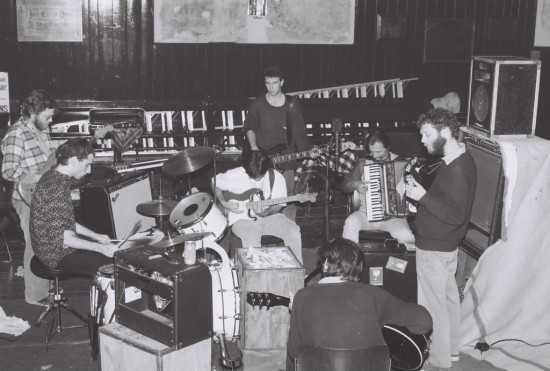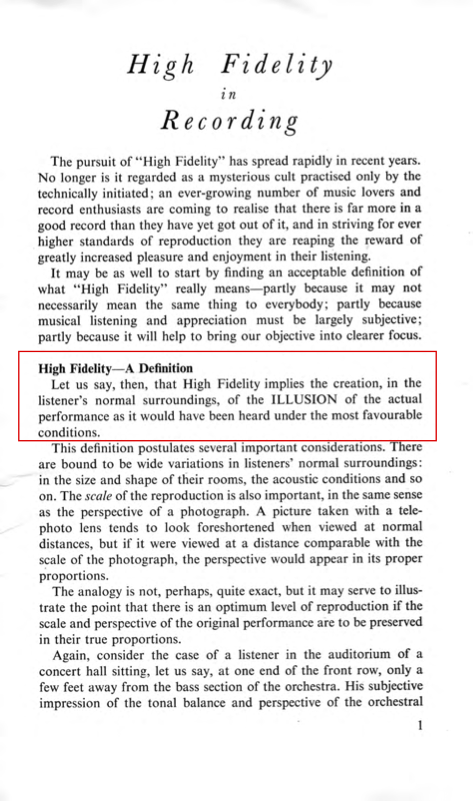Interesting article, although it's not always clear if the object of the discussion is transparency in recording or transparency in playback; and I find his take on some of the concepts a bit confusing or perhaps confused would be a better way to describe it. For example:
However, in the case of purely digital recordings, such as a digital synthesizer directly connected to a digital mixing board, there never was any movement of air to be picked up by microphones that constituted the sound of the synth. The “sound” was in its origination nothing but a series of ones and zeros until converted to analog and played back over loudspeakers. So, in the synthesizer case, the recording is completely transparent because it is strictly identical to the original performance.
If the sound produced by the synthesizer into the mixing board wasn't pan-potted, EQ'ed or subject to effects like reverb to create space or soundstage then the system becomes the instrument and it's not a recording we are dealing with but something closer to a performance by proxy or a time-delayed, repeateable creation of what the author calls the original sound. The system is not so much reproducing the sound of recorded instruments but has become the instrument.
This distictintion between
production (instrument) and
reproduction (system) is of the greatest significance when discussing the
domestic reproduction of recorded music.
The hi-fi system is designed to reproduce the recording with the highest possible accuracy. And because the only connection between the system and the music is the recording
the only "transparency" possible is to the recording, not the original event (when there was one). When we say that our system reproduces music we are referring to the recording; the recording (signal) is in every practical sense the music.
If we use photography as parallel, the system is our photo printer. It has no direct connection to the Mona Lisa painting so it relies on the quality of the photograph of that painting to reproduce the original. A higher fidelity printer will reproduce the recorded image more accurately, regardless of how accurately the photo is representing the original (painting), and no amount of tweaking or "tinting" will make it look like the original if you don't have it next to your computer display for direct comparison.
As for the meaning of
musical event, it refers to the activity of musicians playing together, simultaneously, in the same place (though modern technology does allow for a musician to play remotely in the case of an amplified performance), like a piano recital or a rock concert.
Many studio recordings are not the result of a single musical event but a collage of individual events which may have taken place in the same studio or sometimes in studios that are located in different continents: a second "nature" is created. These types of recordings, which we can perharps refer to as
studio mixes or studio productions, usually consist of a combination of isolated recordings of different instruments and vocals, usually picked up in mono, close mic'ed in semi- or non-reverberant environments, or plugged directly into the mixing desk. In this case,
the mix is the music. It did not originate from a (single) musical event.
An event takes place when these same artists get together for a live performance but vocals and acoustic instruments will still be picked up in mono, close mic'ed, in non-reverberant environments and electric and electronic instruments plugged directly into the mixing desk and then amplified to the audience. Therefore
a recording of an amplified performance is still a mix.
My concept of "documental" recording is considerably different from that of the author.
As I see it,
"documental" recording aims at registering a live event so that its reproduction will create the illusion of being part of the audience. It's how the recording is produced, not the object of the recording that gives it its name.
It requires the use of minimal mic'ing, adequately positioned to include both direct sound from the instruments and vocals as well as the ambience cues (early reflections, reverberation) of the space where the event took place.
This type of approach, capturing the sound of instruments and vocals in a naturally reverberant space, is mostly but not exclusively used to record classical music. Cowboy Junkies' The Trinity Session album was recorded in a church with the band playing live into a single two-channel microphone, though to be honest no one would be listening from the centre of a circle formed by musicians (2L label does this too).
Unlike most studio mixes, the purpose of "documental" recording is to represent reality. And because realism consists of both timbral fidelity and soundscape correctness it is of paramount importance that the most accurate equipment is used but also that the technique mic'ing chosen is fit for purpose. This rules out both close-mic'ing and multi-track or spot-mic'ing.
"
Real stereo" is the only way to faithfully capture a soundscape; other methods can only produce a fabricated soundstage. And "real stereo" requires that each channel be the result of the sound captured by a single dedicated mic, though in cases where the acoustics are difficult or the ensemble is too big the benefits of sensibly adding a pair complementary ambience mics will outweigh the disadvantages.
With documental recordings the "transparency" begins with the placement of the mics.
This page was taken from a old 1950s EMI document titled "The Pursuit of High Fidelity...":
...
When Transparency Is Impossible
An effective criticism of transparency as an audio possibility will have to do more than show that listeners play a crucial role in music appreciation, or demonstrate that they have variable preferences. It is too tempting for a defender of transparency to appeal to a neutral, ideal listener. So what would conclusively undermine transparency? The central conceit of transparency is that there is a possible auditory isomorphism between the original performance and its reproduction. Such isomorphism is possible only if there is something that the original performance sounded like. If there is no such thing as an original performance, or nothing that it sounded like, then transparency would be unattainable.
When it comes to the
playback, it is perhaps safe to claim as indisputable fact that
the ultimate goal of a music reproduction system is to provide listening pleasure.
But if or once we agree that
the only "transparency" possible is to the recording (signal) then the writer's argument for a "tinted" (non-transparent) system collapses.
Most recordings have issues, some more pronounced than others but if the argument for a "tinted" system is to increase the realism then surely one must agree that different recordings require different kinds and magnitudes of "tinting".
And one must also take into account that most forms of "tinting", even in very minute servings, will almost invariably have a negative impact on signal / sound quality and consequently on realism. Distortion in playback makes the reality that we are listening to a reproduction all the more obvious.
Perhaps "transparency" in regards to
playback is more relevant for the reproduction of "documental" recordings.
On the concept of "transparency" in regards to
recordings I believe that it makes sense as a goal in documental recording.
It is not achievable with studio mixes, though some genres like jazz benefit from a kind of production that constructs a more realist illusion whilst others have only to gain from the creative use of effects and colourations.
One particular effect created in stereo mixes that has a lot of success amongst audiophiles is the soundstage.
...
I agree with the bit about musical preferences (I'll add also cultural bias and live sound experience) ultimately impacting our equipment choices as well as defining our stance in regards to "transparency" in the playback:
Understanding audiophile aesthetics in this way helps to shed some light on debates and choices within the audiophile community.
Which is a better speaker system: full range electrostatics by Martin Logan or a pair of comparably priced horn-loaded speakers from Klipsch? There is no absolute answer to this question. It is largely dependent on the music and listening that one does. Martin Logans are very inefficient, highly directional, and have relatively weak low bass response. On the other hand, they are incredibly precise, accurate, and seem to disappear behind the sound. What Klipsch speakers lack in finesse they make up for with ringing clarity, tremendous efficiency, and stentorian bass. Someone planning to sit and listen to Arvo Pärt’s subtle, spare piece “Sarah Was Ninety Years Old” (Pärt 1991) will find the Martin Logans to be mesmerizing. But the Klipsches are a better choice for someone intending to host a party and play Kanye West’s thump- ing “Wack Niggaz” (West 2005). Which are the superior speakers depends on one’s own musical choices. 



